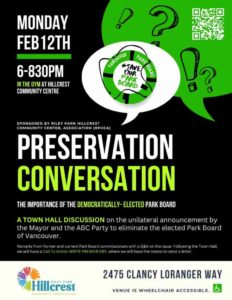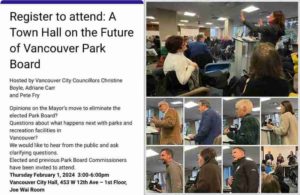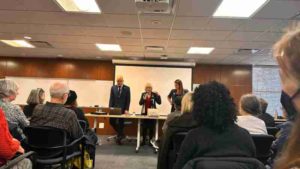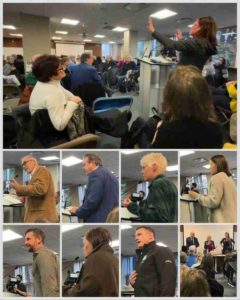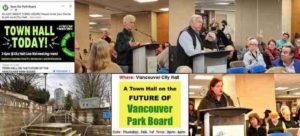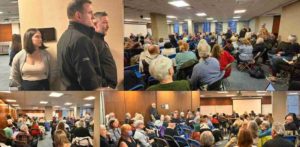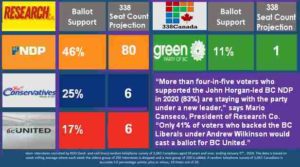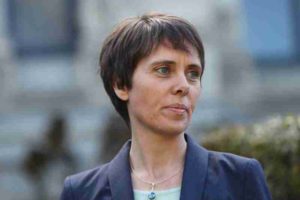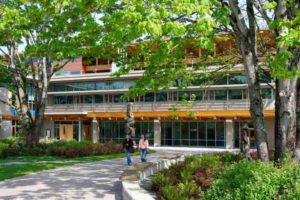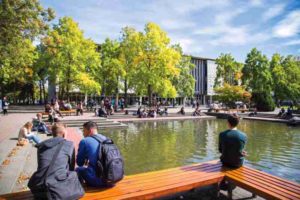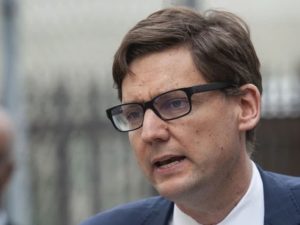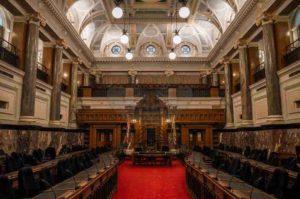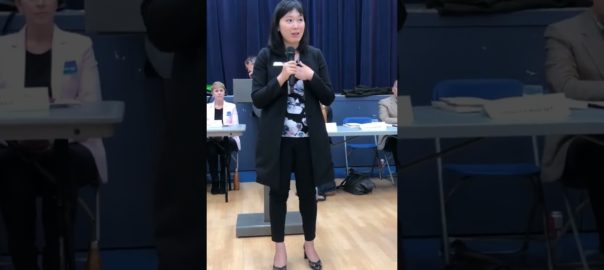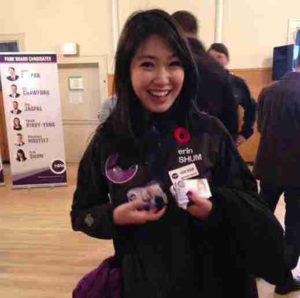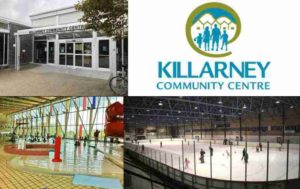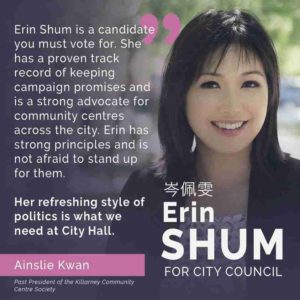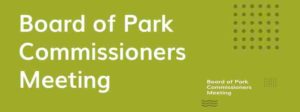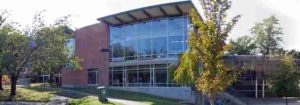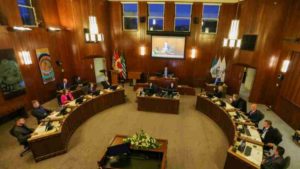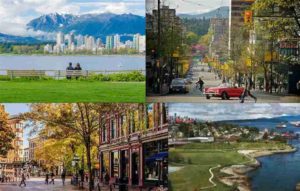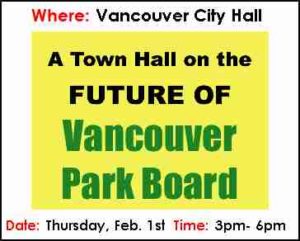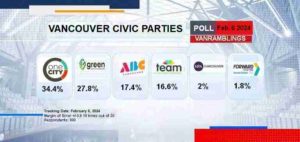
In the 2022 Vancouver municipal election, the upstart ABC Vancouver civic party — a creation of founder / financier Peter Armstrong — came out of nowhere to secure an overwhelming victory at the polls, securing 34.5% of the vote, with the Greens trailing at 11.24%, and OneCity Vancouver managing 9.79% in voter popularity.
How ABC Vancouver’s fortunes have changed only 15 turbulent months later.
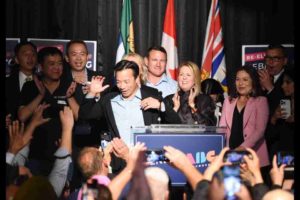
Saturday, October 15, 2022 | ABC Vancouver wins the Mayor’s chair, electing eight City Councillors
Let us count the ways in which ABC Vancouver has lost popularity with the public.
- ABC Vancouver’s first budget raised property taxes by a whopping, unprecedented 10.7% (triple that for small business), alienating huge portions of the public;
- ABC Vancouver jettisoned the City’s Livable Wage Programme, which pays the employees of suppliers of goods and services to the city approximately $24-an-hour;
- ABC Vancouver shuttered the City’s Rental Office, telling the public that the monies it took to run the Rental Office would be transferred to TRAC, the Tenant Resources and Advisory Centre, and would move TRAC into new offices on Howe Street downtown.
Surprise, surprise, TRAC has not moved into the new offices that had been promised, which three years on remains under construction, and in addition, has yet to receive one red cent from the City. You gotta love “conservatives”: they lie like we breathe; - On December 13, 2023, Vancouver’s rookie Mayor, Ken Sim, announced that his ABC Vancouver City Council would abolish the cherished 135-year-old Vancouver Park Board, with an application to the province to change the Vancouver Charter to facilitate an undemocratic, unmandated, appalling change in City governance.
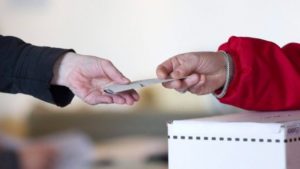
In 2022, a paltry 36.3% of eligible voters turned out at the polls to elect a new Vancouver City Council, School Board and Park Board — which means that the vast majority of Vancouver voters … 63.7% … stayed home, and couldn’t be bothered to, either, inform themselves of the issues in the last Vancouver municipal election, or take an hour or less to attend at their local polling station to cast their ballot.
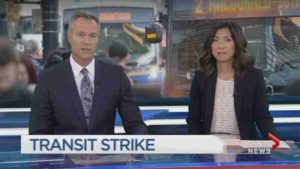
Global BC newscasters Chris Gailus and Sophie Liu host B.C.’s top-rated suppertime news programme
Numeris (formerly the Bureau of Broadcast Measurement) is Canada’s audience measurement organization, tracks our country’s highly fragmented and increasingly complex media landscape, as it attempts to bring clarity and an understanding of audience behaviours and insights to an evolving cross-media landscape.
According to Numeris, only 18% of British Columbians tune in to watch news programmes on Global BC, CTV Vancouver, CBC Vancouver and CityNews, and their local affiliates’ news programmes. Where, then, do British Columbians get their news, if 82% of B.C. adults don’t get their news from television news programmes?
Newspapers remain a popular deliverer of the news for people age 35 and older.
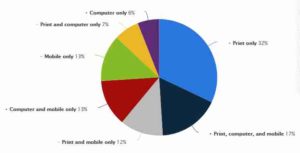
The findings of a study held in Canada between October 2022 and September 2023 revealed that 32% of Canadians only read print newspapers on a weekly basis, whereas 6% read newspapers via computer only. For those persons between the ages of 35 and 49 across all regions in Canada, only 23.89% of persons in that age bracket read, watch or listen to the news once a week or more.
A growing number of people selectively avoid news stories, such as the war between Israel and Gaza, Russia’s invasion of Ukraine, and the cost-of-living issue.
Thirty-eight per cent of those surveyed actively avoid the news, up from 29% in 2021, according to the Reuters Institute for the Study of Journalism. Around 36% — particularly those under age 35 — say that the news lowers their mood.
“Large numbers of people see the media as subject to undue political influence, and only a small minority believe most news organizations put what’s best for society ahead of their own commercial interest,” writes Reuters Institute Director Rasmus Kleis Nielsen, in a Reuters report based on an online survey of 93,432 people, conducted in 46 markets across Canada.

Gen Z (1997-2012) and Millennials (1980-1996) acquire news, predominately, from their Tik Tok app
Younger audiences, those under 45, are increasingly accessing the news via platforms such as TikTok, or from their friends, and have a weak connection to online or conventional media. Forty percent of that age group uses TikTok daily, with 15% saying they use it to find, discuss or share news.

What is the context and meaning of the preceding information, and its impact on Vancouver politics, the current fight to preserve Vancouver’s Board of Parks and Recreation, and the re-election chances of ABC Vancouver come 2026?
Where Vision Vancouver’s success in their ten years at the helm of politics in Vancouver was dependent on three groups who consistently turned out in droves to support the party at election time …
- Unions. Vision Vancouver set the wage scale agenda during their time in power, not just locally, but in municipalities across British Columbia and beyond, in the public sector where it moved the provincial government off its 1-1-1 agenda, and by extension in the private sector, the union vote in the City of Vancouver, loyal and consistently good for 45,000 votes at the polls in strong support for Vision Vancouver;
- The active transportation lobby (think: Hub Cycling), who are committed to bike lanes and a healthy, environmentally friendly and livable city, with fit, cycling Millennials turning out in droves to re-elect Vision Vancouver at election time; and …
- The 2SLGBTQIA community, whose support Vision Vancouver worked tirelessly to gain and maintain, and for whom it could depend on at least 20,000 votes at the polls — as was the case with the bike lobby — in the 2008, 2011 and 2014 civic elections.
ABC Vancouver has no natural constituency in our decidedly progressive, left-of-centre, NDP-voting city on the far shores of western Canada.
The 2022 Vancouver municipal election was a “kick the bums out” election, with dismayed, disgruntled and disquieted Vancouverites sick-and-tired of a lazy, do-nothing, whiny Kennedy Stewart administration, which had non-productive relations provincially with John Horgan’s NDP government, federally with Justin Trudeau’s Liberal Party of Canada, and in 2022 with the Vancouver electorate.
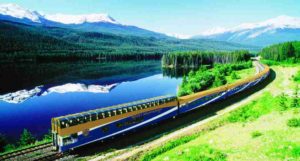
As we say, ABC has no natural constituency in the voting Vancouver electorate, their election to civic government in 2022 a blip on the political radar, and consequent from a dissatisfaction among the electorate with the previous administration, a well-run campaign by master electoral tactician and motivator, Kareem Mahmoud Abbas Allam, and bucketfuls of money from Rocky Mountaineer tourism founder Peter Armstrong, and Lululemon lifestyle founding promoter, Chip Wilson.
Well, Mr. Allam is gone now — having pulled away from ABC Vancouver one year ago — the powers that be at The Vancouver Club and Terminal City out for blood and set to do all in their power to oppose the re-election of Ken Sim and company, not to mention a significant and engaged majority of the 36.3% of Vancouver voters who turned up at the polls in 2022 also out for blood, alienated beyond all measure with the autocratic, anti-democratic administration of Ken Sim and his crew of “we’ll go along to get along, and do whatever” ABC Vancouver lickspittles.
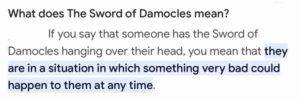
The Sword of Damocles hangs ominously and precariously over the heads of the “certain to be one term” ABC Vancouver administration at Vancouver City Hall, the arbitrary and unilateral move to eliminate Vancouver’s cherished Park Board — which over the past 135 years has given the citizens of our province a world class parks and recreation system — the final straw, as engaged Vancouverites in high dudgeon, certain to work towards not the elimination of the Vancouver Park Board, but the elimination of the “they know the cost of everything, and the value of nothing” ABC Vancouver civic party from the political landscape of our city.
